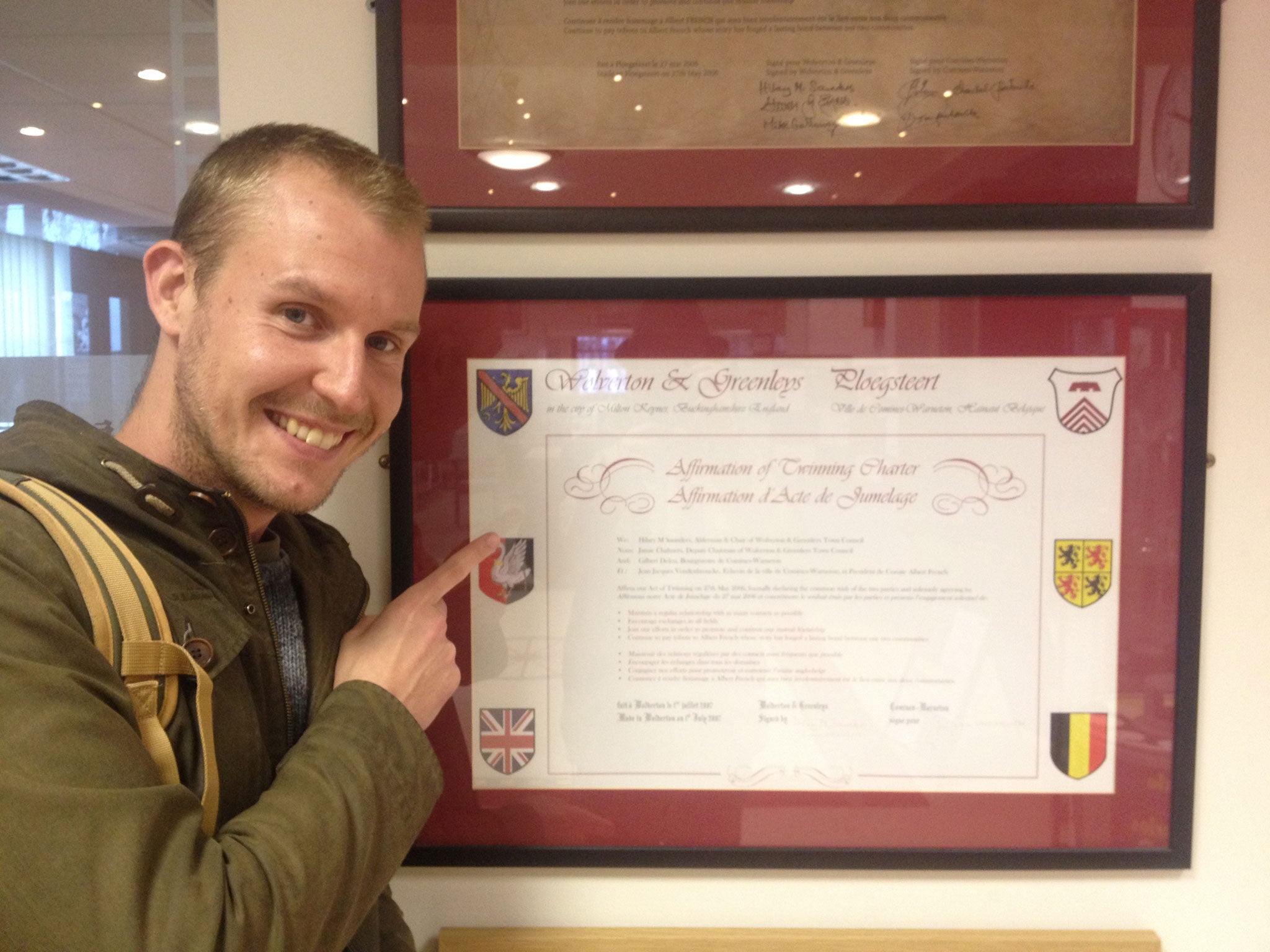Letters posted during First World War sparked a relationship between towns in England and Belgium
Albert French was a young Wolverton lad who travelled to Ploegsteert to fight in May 1916. A month later - as back home his sister May was writing him teasing letters - he was killed by a bullet

Travelling companion: My housemate
Trip: To Wolverton and Ploegstreet
As a man who I guess is Michelle's dad approaches through the Wolverton drizzle, his flat cap tipped down, I smile to myself. The number of people who have met and become friends in this way over the past 65 years, I think: strangers from random towns greeting each other on the street…
Wolverton is a small town a stone's throw from Milton Keynes. My housemate Goodie and I are here as part of the UK leg of my town-twinning adventure. It's an adventure that started years ago, with a little curiosity, some booze and a challenge that took me 10,000 miles around Europe and is now taking me round the UK.
We parked up at lunchtime outside the town's Victorian bath house, ready to meet a local, Dave.
"Remind me who Dave is," said Goodie, as we wandered the puddled high street looking for a café.
"He's Michelle's dad. Michelle who I used to work with. She grew up in Wolverton and sent me to its twin town in Belgium, Ploegsteert. Dave's giving us a tour."
Goodie nodded and smiled as you do when you're speaking to eccentric nan at Christmas.
Before we can find somewhere to eat, Dave leads us into the Old Bath House to meet a local group of "yarn bombers" – a mysterious group of ladies who decorate Wolverton in knitwear. (They're very secretive. I daren't say more for fear of woollen reprisals.)
"So this building was the bath house for the railway works?" I ask Dave as we say goodbye to the Knit Wits. "It was, yes. Built for the town in 1890. The railworks were established here in 1838. We're halfway between London and Birmingham: a perfect location for railways."
Outside, we bump into Hilary, chair of the personnel committee for Wolverton West Ward. "Hilary, meet Rob and his friend. They're in Wolverton because of town-twinning and our friends in Belgium."
Hilary's eyes light up. "Rob, we have a visit to Plugstreet in the summer, as it will be 100 years since the death of Albert French."
French was a young Wolverton lad who travelled to Ploegsteert ("Plugstreet" to the Allies) to fight in May 1916. A month later – as back home his sister May was writing him teasing letters, "soon to be sweet 17 and never been kissed" – Albert was killed by a bullet.
On 27 May 2006, almost exactly 90 years after Albert entered the trenches, a town-twinning charter was signed, close to where his body now lies, sparking a deep friendship between these two distant towns.
"More than 70 of us will drive to Ploegsteert," Hilary tells me. "Our brass band will perform a concert with our friends in the Ploegsteert band on the Saturday. Then on the Sunday there's a memorial service. It's always such a good visit. The Belgians are very hospitable."
Next we meet Roger Kitchen, the man who discovered French's letters back to his sister. "I collect old embossed books," he says, pointing to encyclopaedias making the shelf bow in his living room. "When I unpacked those, there was an envelope at the bottom of the box. And there were the letters."
Standing beside Albert's gravestone outside Ploegsteert, close to the end of my European road trip, I remember thinking how difficult twinning must have been in the early days: visiting, in some cases, the "enemy"; walking into their houses; sharing their culture; eating their food; struggling with their language. Once upon a time, town-twinning had a heart and a purpose. In the 1950s, it played an important role in reconnecting a broken and distrustful Europe. In the 1960s and 1970s, it helped all generations reach out and cross borders.
Today, its spirit remains, but its popularity has stalled. With Facebook and Airbnb stealing the headlines, twinning is losing its place. I find that very sad. Because now, as the right begins to rise across our continent, as the European Referendum creeps closer, we need its heart and its purpose more than we have in a long time.
For more twinning tales, 'Twinned with...' by Rob Self-Pierson is available from waterstones.com and bowtiebooks.co.uk
Subscribe to Independent Premium to bookmark this article
Want to bookmark your favourite articles and stories to read or reference later? Start your Independent Premium subscription today.

Join our commenting forum
Join thought-provoking conversations, follow other Independent readers and see their replies